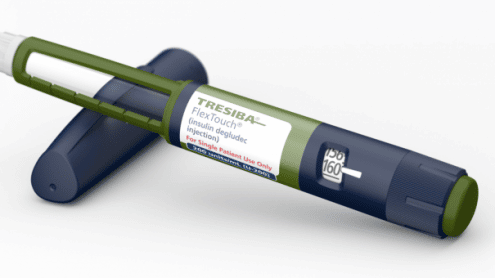Tresiba dosing. Tresiba is a long-acting medication that contains insulin degludec and is used to treat Type 1 and Type 2 diabetes.
Tresiba dosing varies according to the type of diabetes a patient has, their age, and their previous use of insulin. It is available in two dosage units:
Tresiba U-100 is available in vials and as a FlexTouch pen. The FlexTouch contains 300 units of insulin degludec (100 units/mL) and the vial contains 1000 units.
Tresiba U-300 is available only in a FlexTouch pen and it contains 600 units (200 units/mL) of insulin degludec.
Insulin-Naïve Patients
Certain patients will not achieve normal blood glucose levels when they are treated with oral anti-diabetic drugs (OAD). These patients are treated with a combination regimen of insulin alongside OAD.
The insulin dosage for these patients differs from those who rely only on insulin to treat their diabetes. Insulin-naïve patients can be type 1 or type 2 diabetic.
Tresiba Dosing
Insulin-Naïve Adult Patients with Type 1 Diabetes
The Tresiba starting dose for Type 1 insulin-naïve patients is approximately one-third to one-half of the required daily insulin dose. The remaining dose is divided between meals and is given as short-acting Insulin.
The standard calculation used to determine the initial total daily dose is 0.2-0.4 units/kg body weight.
Insulin-Naïve Adult Patients with Type 2 Diabetes
The recommended dose for insulin-naïve patients with Type 2 diabetes is ten units once per day.
Insulin-Naïve Pediatric Patients with Type 1 Diabetes (1 year and up)
The starting dose of Tresiba for insulin-naïve pediatric patients is the same as for adults, except there is no second dose. A single dose of one-third to one -half of the daily insulin requirement is given once daily. Similar to adults, the dosage calculation is 0.2 to 0.4 units per kilogram body weight.
Insulin Naïve Pediatric Patients with Type 2 Diabetes (1 year and up)
The recommended dose for insulin-naïve pediatric patients with Type 2 diabetes is ten units once per day.
Current Adult Insulin Users
Type 1 and Type 2 diabetics who are currently using insulin should continue using the same dosage of Tresiba, once per day.
Current Pediatric Insulin Users
Pediatric patients who are currently using an insulin medication are at risk of developing hypoglycemia. To minimize this risk, the Tresiba dosage is adjusted to 80% of the total daily dose and is given once per day. The same dosage applies for both Type 1 and Type 2 diabetics.
Administration Instructions
- Do not use the drug if the vial has any colour changes or appears cloudy
- Check the insulin label properly
- Rotate injection sites (thigh, arm, and abdomen) to avoid lipodystrophy and localized cutaneous amyloidosis
- Pediatric patients who require less than five units per day should use Tresiba U-100 vial
- Do not dilute or mix the drug with other insulin products
- Do not use this drug if you have diabetic ketoacidosis
Conclusion
Always follow the instructions of your physician or endocrinologist regarding your insulin dosage and the frequency of administration. Adults can use Tresiba at any time of day. For pediatric patients, this insulin should be administered according to the established dosage schedule.
Adult patients who have missed their daily dose of Tresiba should take the next after a period of eight hours. For pediatric patients who have missed a dose, a physician should be consulted.
—
Disclaimer: Please note that the contents of this community article are strictly for informational purposes and should not be considered as medical advice. This article, and other community articles, are not written or reviewed for medical validity by Canadian Insulin or its staff. All views and opinions expressed by the contributing authors are not endorsed by Canadian Insulin. Always consult a medical professional for medical advice, diagnosis, and treatment.


